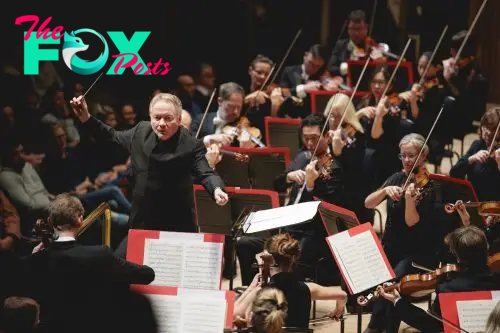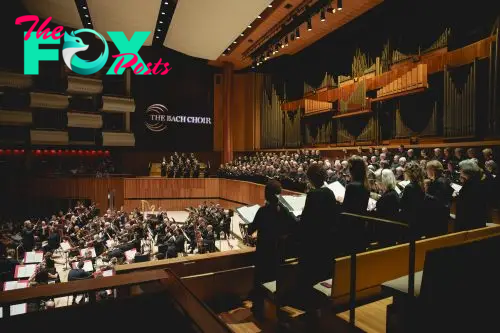Entertainment
Final ounce of spirituality lacking from The Dream of Gerontius on the Royal Pageant Corridor – Seen and Heard Worldwide
 United Kingdom Williams, Elgar: Jennifer Johnston (mezzo-soprano), Daniel Norman (tenor), Roderick Williams (baritone), The Bach Choir (musical director: David Hill), Philharmonia Orchestra / David Hill (conductor). Royal Pageant Corridor, London, 16.5.2024. (JR)
United Kingdom Williams, Elgar: Jennifer Johnston (mezzo-soprano), Daniel Norman (tenor), Roderick Williams (baritone), The Bach Choir (musical director: David Hill), Philharmonia Orchestra / David Hill (conductor). Royal Pageant Corridor, London, 16.5.2024. (JR)

Roderick Williams – Cusp (world premiere)
Elgar – The Dream of Gerontius
The Bach Choir has a powerful dedication to new music, they usually purpose to fee a brand new work each two years. The choir has for a while had a detailed relationship with baritone Roderick Williams, they usually turned to him as a composer for a brand new work to precede the The Dream of Gerontius. With the poet Rommi Smith, he has produced Cusp, an uncommon and never unattractive piece with regards to demise which is designed to enrich the Elgar. I had anticipated Williams to take extra of lively half in his personal work however, humble as he’s, he hardly sings in any respect; he sits and, for essentially the most half, watches the response of the viewers along with his customary wry smile; the refrain will get the lion’s share of the work they usually sing it clearly and effectively.
The 20-minute piece begins and ends with a recording of a hospital restoration room – I’ve to say, if I had not learn the programme, I might have had no inkling of what the sounds had been meant to symbolize. Williams interviewed various singers with The Bach Choir who had suffered bereavement, and their experiences and quotes are used within the libretto. The work is split into the 4 seasons of grieving, Autumn to symbolize decline and demise, Winter is grief, Spring is hope, and Summer season is reminiscence and therapeutic. It’s a shifting piece, with an clever libretto by the poet Smith although it somewhat outstays its welcome. ‘Ask me what love is? Generally, it’s a cup of tea’ is a line I actually favored.
Musically, Williams steers a firmly tonal path with only one discordance and clear affinity with the English choral custom – I heard the sound worlds of Britten, Rutter and TipPett. The choir has loads of work to do, with a number of traces layered piecemeal throughout the sections. The orchestration has its personal appeal, with plentiful use of percussion. I might suggest using surtitles in future performances as not everybody was following the phrases printed within the programme and would have discovered among the textual content inaudible.
The viewers had been requested initially of the live performance to chorus from applauding on the finish of the Williams work which led seamlessly and successfully into the Prologue of the Elgar. Personally, I might have most well-liked the Elgar to have stood by itself and never need to be divided into two halves with an interval.

David Hill wrote the very prolonged programme notes introducing the Elgar. He harassed that the work presents large challenges to all its performers. The tenor has a gargantuan process and desires loads of stamina. The soprano, because the Angel, must conjure up ethereal magnificence, to ravish the senses. Hill writes: ‘Ultimately it’s the compelling great thing about the sound itself which makes so many people lengthy to listen to the work repeatedly, as soon as the Angel’s farewell has echoed away into the space’.
Tenor Daniel Norman has sung the position of Gerontius however not in London. He had glorious eye contact with the viewers, and acceptable gestures however I used to be not solely satisfied by his portrayal: I heard no exasperation, no pleading. Although he had tried to maintain some heft in his voice in reserve, his ‘Sanctus Fortis’ and ‘Take Me Away’, highlights of the work, lacked energy and desperation and we heard the odd croak. Norman might be becoming a member of the ensemble of Zurich Opera within the coming season and might be a worthwhile addition to their quantity. Roderick Williams, as baritone, can do no improper and he was faultless because the Priest and the Angel of the Agony. He rode over the sound of the complete orchestra and 200-strong choir with ease. Jennifer Johnston was spectacular in her low registers; sadly the highest notice of her last ‘Alleluia’ went awry. Her last farewell ‘Softly and gently’ was comforting and sublimely delivered.
The Philharmonia Orchestra performed effectively; inevitably with little rehearsal and the conductor, retaining a fair tempo, neither rushed nor dragged, focussing on the choral components. I missed some Elgarian orchestral sweep and articulation.
The Bach Choir had been splendid throughout the board, regardless that the tenors had been closely outnumbered by the opposite sections. Diction was clear, intonation flawless, the troublesome technical part as demons convincingly and precisely portrayed, with the appropriate diploma of nastiness in ‘dispossessed, apart thrust, chucked down’. They took up each seat within the choir part and in ‘Reward to the holiest’, compounded by the organ, made an exciting and uplifting sound. I used to be notably taken by the altos, most rhythmic within the ‘To us His elder race’ part.
Finally, this was not maybe essentially the most shifting Gerontius I’ve heard, the final ounce of spirituality and hushed magic had been lacking, it proved to not be a lot of an emotional expertise; the tenor was maybe the least convincing of the trio of soloists, but it surely was definitely a great high quality efficiency and, as David Hill mentioned, it’s all the time good to listen to a efficiency of Elgar’s choral masterpiece.
John Rhodes
-

 Entertainment1h ago
Entertainment1h agoThe Best Internet Memes About Elon Musk’s Tesla Robot
-

 Entertainment2h ago
Entertainment2h agoThe TikTok Duo Behind the Music in Moana 2 on Winning a Grammy and Working With Beyoncé
-

 Entertainment7h ago
Entertainment7h agoGladiator 3 Already in Works, Reveals Director
-

 Entertainment12h ago
Entertainment12h agoHow ‘Interior Chinatown’ Satirises Asians in Hollywood with Witty Social Commentary
-

 Entertainment23h ago
Entertainment23h agoHow to See Ava, Chiang Mai Night Safari’s Golden Tiger
-

 Entertainment23h ago
Entertainment23h agoDictionary.com Names ‘Demure’ as Its Word of the Year for 2024
-

 Entertainment1d ago
Entertainment1d agoAnna Delvey Reunites With Ezra Sosa and Flips Him Off Ahead of ‘Dancing With the Stars’ Finale Return
-

 Entertainment1d ago
Entertainment1d agoMethods to Recharge as an Actor

























